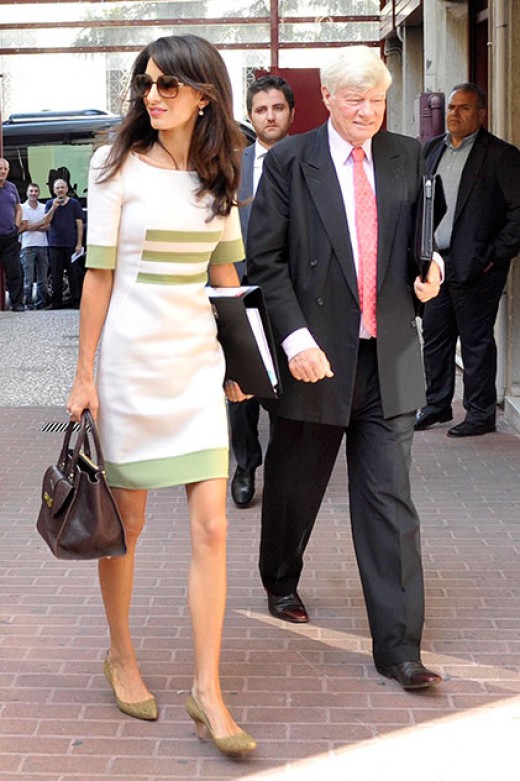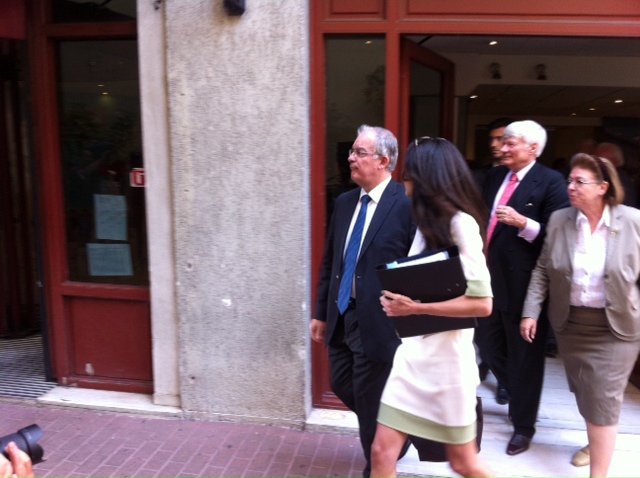Ttitle photo: amna.gr/ Yannis Kolesidis
Anastasia Balezdrova
On the first day of her visit to Athens Amal Clooney brought optimism regarding the Greek request for the return of the Parthenon Marbles that are now in the British Museum. The issue had faded over the past years and it had been considered even a "mission impossible" until recently. Hollywood star George Clooney’s beautiful wife, however, dispelled the pessimism by saying, "I hope that we will succeed," and repeated this both upon leaving the hotel and during her meeting with the journalists who were waiting for her outside the Ministry of Culture.
Definitely beautiful and very charming Amal Clooney entered the office a few minutes before the scheduled meeting with Minister Konstantinos Tasoulas. She was wearing an elegant beige dress with olive green elements, looking both beautiful and businesslike. She held her handbag in one hand and a folder with documents in the other.

Her arrival greatly excited all employees in the building, from the police officers guarding the entrance to the staff in the various offices, many of whom appeared on the fifth floor that houses the Minister’s office, hoping to catch a close glimpse of her.
In addition to Amal Clooney the meeting that lasted an hour and a half was attended by prominent British lawyers Geoffrey Robertson and Norman Palmer, chairman of the International Association for the Reunification of the Parthenon Sculptures David Hill, Chief Secretary of the Ministry of Culture Lena Mendoni, director of the Acropolis Museum Dimitris Pandermalis, director of the "Sale of Antiques and Private Archaeological Collections" office Eleni Korka and chairman of Melina Mercouri Foundation Christoforos Argyropoulos.

Photo: naftemporiki.gr
After the meeting, Minister of Culture Konstantinos Tasoulas stated that the three British lawyers have presented their proposals and opinions on the probability of the request for the return of the sculptures being submitted to a judicial institution. Immediately afterwards the delegation set off to a famous seaside restaurant for a lunch organized in honour of the guests.

Photo: Anastasia Balezdrova
Meanwhile, the schedule on the second day of Amal Clooney and her colleagues’ visit to Athens has been announced. At 11:30 am, she will meet with Greek Prime Minister Antonis Samaras in the government Maximou residence. Shortly before 01:00 pm, they will arrive at the Acropolis Museum where director Dimitris Pandermalis will show them around and at 01:30 pm, they will give a press conference in the conference room.
Afterwards they will have lunch, probably at the restaurant of the museum, and at 04:00 pm, Amal Clooney and her colleagues will visit the Acropolis. The three are due to depart from Athens on Thursday.

Photo: Anastasia Balezdrova
What is, however, the attitude towards the visit of Amal Clooney and the reputable law firm in the UK? GRReporter talked to Nick Squires, a correspondent for the British newspaper Daily Telegraph in Rome, who was in Athens to cover the visit. He pointed out that the topic is of great interest for two reasons. "On one hand we are talking about the Parthenon sculptures of which the British public is well aware. The other reason is that impressionable woman, George Clooney’s wife. We all saw the photos of their fantastic wedding in Venice last month. She looks like a film star and I think the attitude towards her is less like a lawyer and more like a film star."
According to the journalist, Amal Clooney was dealing with the issue of the return of the sculptures "long before meeting George Clooney, namely three years before that."
Squires said that for the most part, the British support the Greek request. "There were many studies showing that the ordinary citizens support this request. Apparently the British Museum does not share this view and this is the reason for the visit of this group of lawyers to Athens today."
In his opinion, Amal Clooney and her colleagues will tackle a particularly difficult task, in view of the fact that the management of the British Museum insists that it had legally obtained the sculptures.
"A possible decision in favour of Greece would be a great loss to the British Museum. The main problem with this case is that if it returns a collection of exhibits this will cause a chain reaction and many countries around the world will demand the return of Egyptian mummies, statues, coins and other artefacts," said Squires, adding, "I suppose the argument of the particular lawyers will be that the Parthenon is a unique monument divided into two, and in no case will its reunification lead to the emptying of museums in Europe and North America. Nevertheless, I think its defence will be difficult."